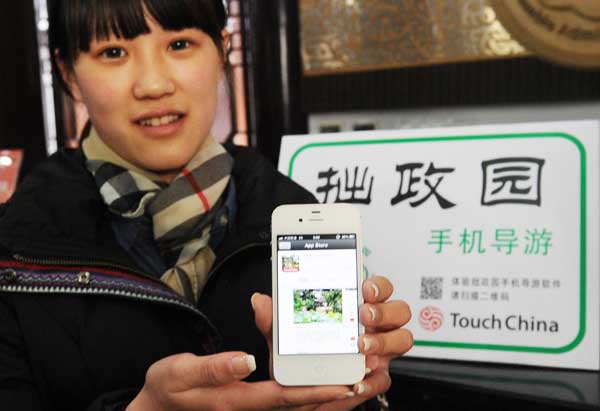Smart travel, or tourism aided by technology, will not only help tourists but boost innovation in the industry, the head of the China Tourism Academy said on Tuesday.
Dai Bin said that thanks to the Internet, cloud computing and mobile terminals, data analysis can now help tourism companies figure out what attracts tourists so the companies can come up with better products and innovative marketing.
 |
|
An employee at Humble Administrator's Garden in Suzhou, Jiangsu province, displays tour guide software on her mobile phone. The software, launched in March, provides information on routes, ticket prices, shops and traffic, among other things, that are related to the UNESCO World Heritage site. WANG JIANZHONG / FOR CHINA DAILY |
He said that most tourists prefer individual travel to package tours. Many destinations such as Taiwan and Hong Kong allow residents from major mainland cities, including Beijing, Shanghai, Xiamen and Tianjin, to visit as individual travelers.
To capitalize on this trend, Beijing's FAB Enterprise Group on Wednesday signed an agreement with Macao's Duty Group worth 630 million yuan ($102.7 million). The two companies will work together on building travel-related mobile terminals and providing themed tours in an attempt to share tourism information nationwide and provide more convenience to travelers.
The companies inked the deal at the Second Beijing Macao Cooperation and Exchange Symposium, which opened on Wednesday in Macao.
Chen Renxue, an employee of the Beijing company, said that mobile terminals allow tourists with smart cellphones to receive information on places of interests, detailed routes, dining hotspots, shopping hubs and hotels.
Such terminals will be built in major subway stations, shopping malls and densely populated communities. Tourists need only to scan their phones at a terminal to get an e-ticket to visit scenic areas and make reservation at hotels, he said.
Visitors can also get audio tour guide at the terminals, Chen said. "It's like having a portable tour guide."
Chen said such mobile terminals in Beijing have served 300,000 visitors in the second quarter of this year.
The National Tourism Administration has promised to boost the application of technology at scenic spots. Beijing, as one of the first trial cities, has seen rapid growth in the use of technology in the tourism sector over the past three years, Dai said.
Xu Weidong, a staff member of the Beijing Tourism Development Committee, said the city has been accelerating its WiFi coverage, and 50 scenic spots in the city will provide self-guided tour services to tourists with smartphones by the end of September.
"The mobile terminals and 3-D technology allow the public to enjoy themselves before they visit the place in person," he said.
However, the development of technology-aided tourism also faces challenges.
"Many places are not covered by WiFi, which makes it impossible for visitors to have access to the information they need," he said. In addition, the high costs of Internet traffic and its slow speed prevent more people from using the services.
Dai also mentioned the lack of channels for tourists to lodge complaints.
"Tourists who are cheated in a place far from their homes are more helpless and desperate than we think, and it is necessary to provide related information as well," he said.


